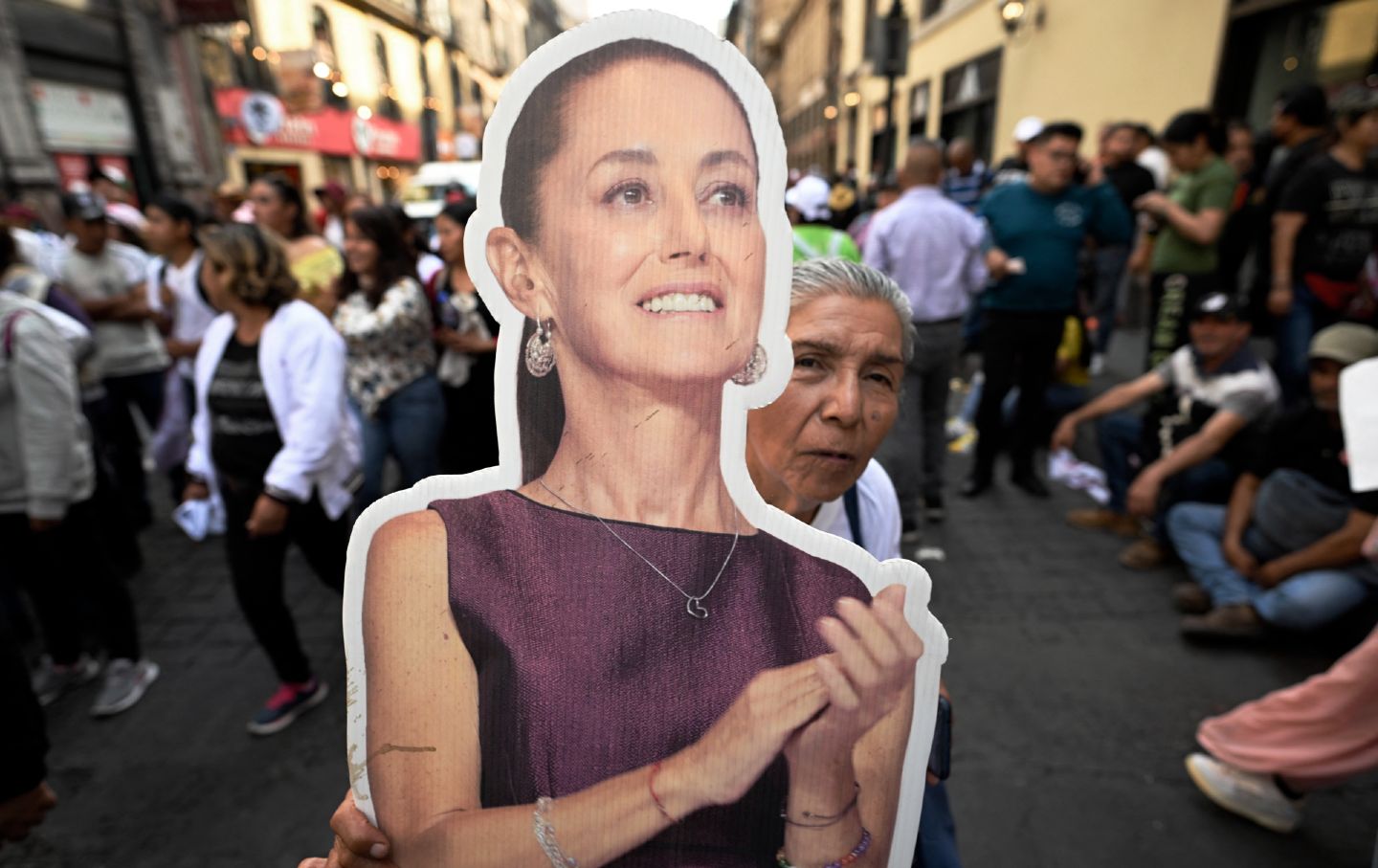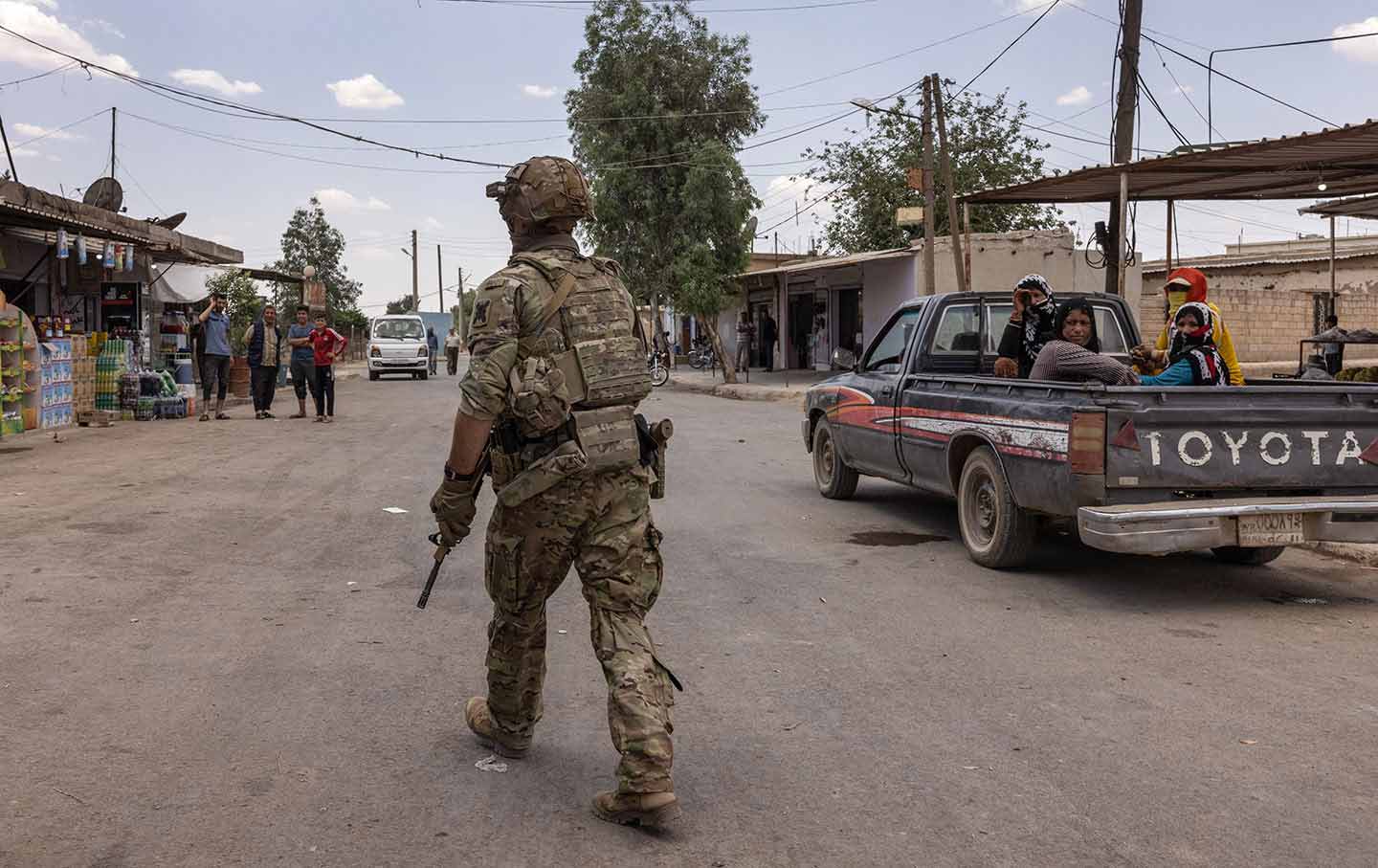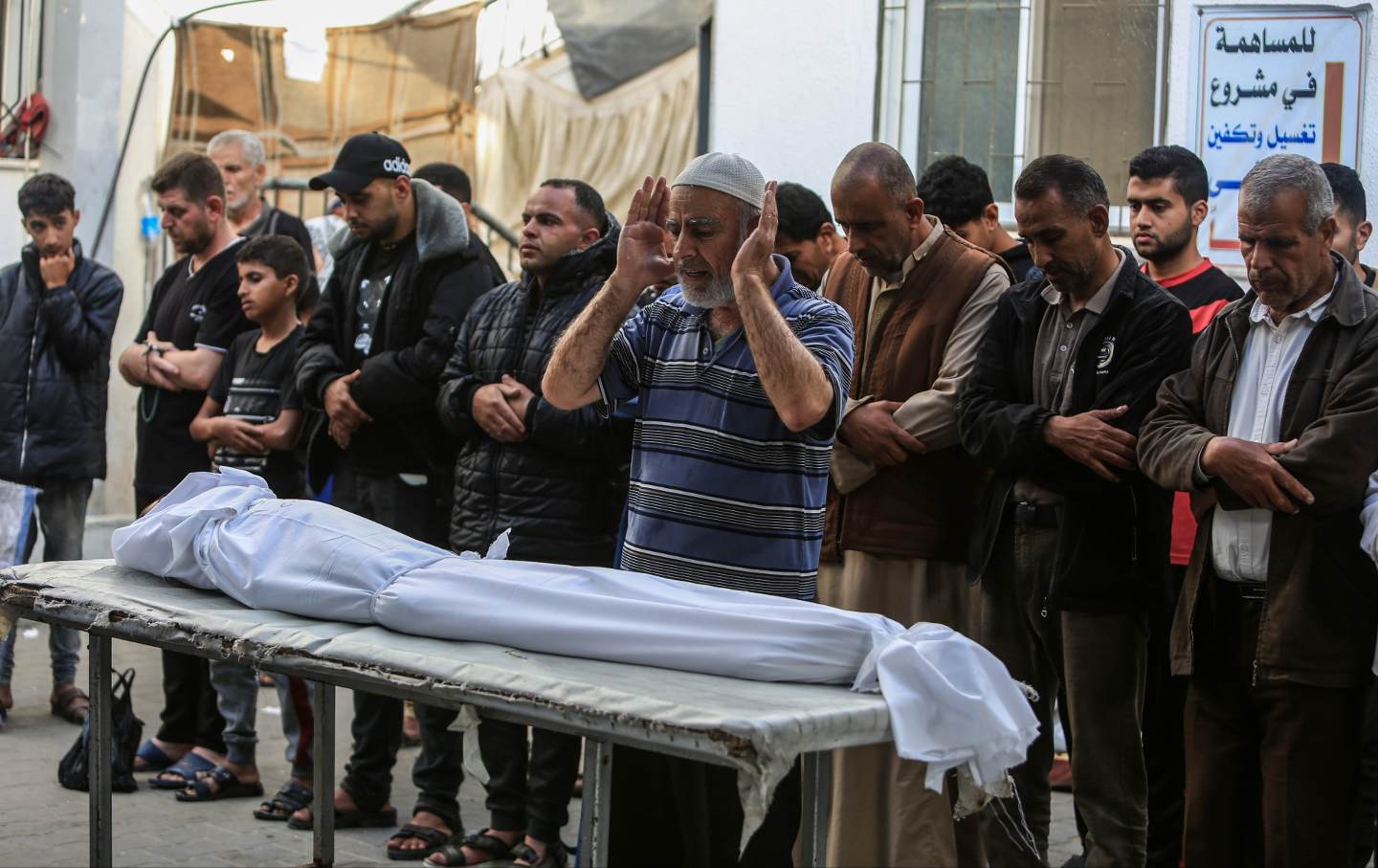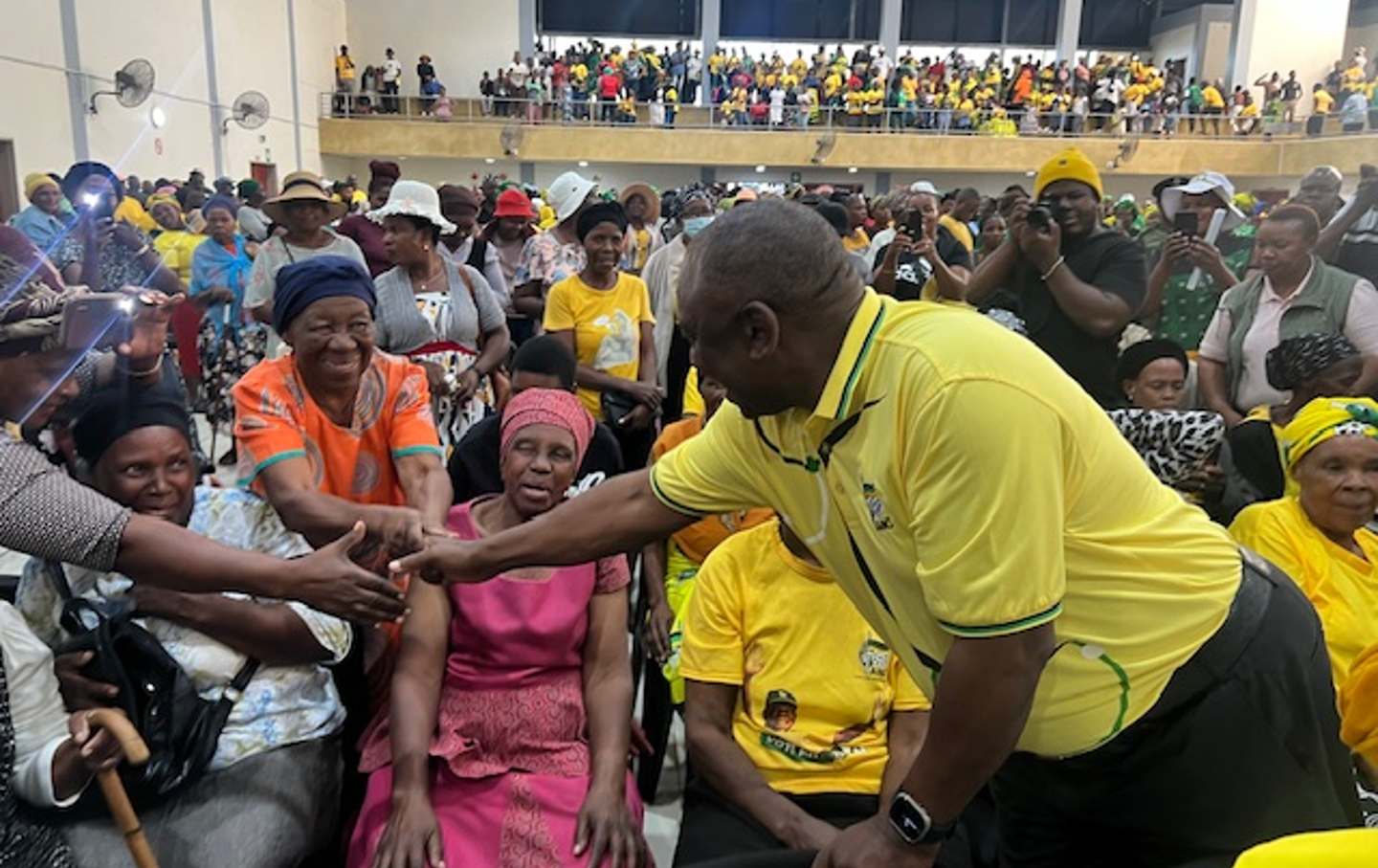
Puebla, Mexico—In early April, José Chedraui—the Morena (Movimiento Regeneración Nacional) party’s mayoral candidate for Puebla, a city two hours southwest of Mexico City—visited my street. He led a procession of about 150 supporters—paid or unpaid, it’s hard to know—who chanted his name as well as various slogans. I went to the roof to take photos, or I would have yelled at him in frustration, “We haven’t had water in two months! Why aren’t you stopping and listening to anyone?”
The conservative Partido Accíon Nactional (PAN) privatized our water in 2013, and Morena promised to de-privatize it during the 2018 elections—but it never did. Residents pay astronomical fees to live off a few liters of water a day or go months without any water at all. We are all certain that whoever is elected, our water problems will continue.
On June 2, voters in Mexico will cast their ballots for 20,375 political positions, including the president, deputies, senators, some governors, as well as local mayors, councilors, and other auxiliary positions. It’s the biggest election in Mexican history, but many of us who live in Mexico think it will change little in our daily lives.
The current president, Andrés Manuel López Obrador or AMLO, is term-limited, so former Mexico City mayor Claudia Sheinbaum is running for president on the Morena ticket against Xóchitl Gálvez, a businesswoman representing a coalition of the Partido Revolucionario Institucional (PRI), PAN, and the Partido de la Revolución Democrática (PRD).
When AMLO and his Morena party ran six years ago on a left-leaning platform, some hoped that after decades of conservative PRI or PAN governments, things would be different. But Morena’s policies of militarization, migrant deportation, and supporting transnational corporations at the expense of Indigenous rights, the environment, and workers have made it clear to social movements that neither side will provide justice. Despite AMLO’s term’s having disappointed many activists, most polls show his Morena compatriot Sheinbaum comfortably winning.
Meanwhile, 45 candidates and others involved in campaigning have been killed. The figure is a symptom of the fight for power and wealth in a country where resources are being tirelessly looted—often by US corporations with the backing of Mexican politicians. The political problems in Mexico go deeper than any one election can fix.
In Mexico City, the main roads are dotted with posters hung from polls; candidates’ faces are on buses, billboards, and train walls. Morena party members have been handing out pens and baseball caps in exchange for people’s putting campaign stickers on the backs of their cars. They have set up free glucose-testing stations adorned in “Vote Morena” banners. This is legal, and the funds likely come from the publicly allocated campaign budget.
Yet there is little substance to these street-level campaigns, only slogans like “Vote on June 2.” While a few people in Morena are genuine activists, political parties largely serve as career platforms, and campaigning tends to be more about marketing strategy than actual policy. Of Morena’s nine gubernatorial candidates, five were originally in right-wing parties. These party-hopping opportunists are called “grasshoppers” (chapulines), and they, for example, make up a majority of Morena mayoral candidates in Yucatán state. Given this phenomenon, along with widespread organized crime and corruption, it’s no wonder citizens do not trust politicians, no matter the party.
Organized crime now extends from charging vendors fees for street space to extorting avocado producers to stealing fuel to human trafficking to terrorizing miners to controlling ports. Gangs often influence local elections, bribing authorities or threatening them so that allies of criminal organizations win or candidates will at least stay faithful to the gangs’ interests.
Eliminating organized crime necessitates that politicians stop taking bribes and start putting the interests of the environment and everyday people before their own pockets and, sometimes, their own safety. None of the parties running have demonstrated that they will do that.
“They don’t look after the people. They don’t listen to the movements,” Clemente Rodríguez said of Morena. He is one of the parents of the 43 student teachers from Ayotzinapa who were disappeared, likely murdered, almost 10 years ago. Recently, a witness came forward and said over half the students were taken by the army, tortured, shot, chopped up, and put in rubbish bags.
For many, the 43 are emblematic of the 116,000 disappeared people in Mexico. One of AMLO’s core election promises in 2018 was to “clear up everything” regarding what happened to the Ayotzinapa students and “punish those responsible.”
Rodríguez and I talked while I visited the Ayotzinapa parents’ protest camp outside the National Palace, where they were demanding that AMLO keep his promise. The government had erected metal fencing all around the palace in response: a statement about where it stands on listening to social movements. AMLO’s government has refused to speak with the parents or to hand over the 800 Army files that would likely resolve the case but also implicate the state.
“I couldn’t get a scholarship to study when I was a student. I’m glad that is an option now—that’s a very good thing this government has done. But that’s it, really,” Rodríguez said referring to the Morena scholarship program for poor students, which gives primary and secondary students 875 pesos ($52) and university students up to 10,500 pesos ($630) monthly.
Popular
“swipe left below to view more authors”Swipe →
“I voted for AMLO to give him a chance. But there hasn’t been any justice. Just roads and mega construction projects,” said Rodríguez.
AMLO has accused the Ayotzinapa parents of being infiltrated by the opposition. Activists say that neither Sheinbaum or Gálvez has seriously addressed the issue, and so they have launched a campaign called “Vote for a forcibly disappeared person,” encouraging people to write the name of a disappeared person in the box for non-registered candidates.
AMLO has been similarly dismissive of the massive women’s marches. He called women marching against femicide rates and impunity for rapists “conservative” and said they are protesting just to destabilize his government. Sheinbaum, for her part, said she is against “violence” in the women’s protests and has failed to acknowledge how angry women are at the lack of justice.
“Governments come and go, but they never get to the heart of the issue, and that’s why the number [of femicides] has increased over the last 10 years.… The governments’ policies have failed because they consist of just pamphlets and campaigns,” María de la Luz Estrada, coordinator of the National Citizens’ Observatory of Femicides told NACLA.
In this year’s women’s march in Puebla, police attacked us with tear gas and water cannons. The resources that national and local governments have put into criminalizing women like myself, while crimes against us are unpunished, speaks volumes.
Building for US interests
There are 31,634 US companies operating in Mexico, and their interests will shape policy no matter who is elected. Corporations like Walmart, Century 21, Newmon Corporation—a gold-mining company—and the thousands of maquila manufacturers (foreign-owned factories that are largely duty- and tariff-free and send the products and profits back to the US) use Mexican resources, while exploiting workers.
General Motors, for example, pays assembly-line workers here just 7,694 pesos ($450) per month, while paying US workers doing the same work $6,400 per month. AMLO has boasted about how his government has encouraged such behavior, and both Sheinbaum and Gálvez have promised to continue to promote such “foreign investment” and “nearshoring,” where companies use nearby poorer countries like Mexico for cheap production.
Workers speaking in Mexico City’s main square during May Day this year complained that AMLO’s government’s “efforts have been insufficient.… None of the candidates listen to us.” And teachers protesting this past week said AMLO “always meets with us but never gives us any solutions.”
Still, some major union leaders have declared that they will back Sheinbaum in this election. In their view, she’s at least better than Gálvez. Plus, many of them have their own political careers to think about.
AMLO boasts of building more than 5,000 miles of roads during its term, and here in Puebla state, Morena built a military and arms manufacturing town, but apparently lacks the resources to guarantee water access or human rights. In 2021, AMLO declared “strategic” projects like these a “national security” interest, so they could be built without proper transparency, permits, environmental impact studies, or Indigenous consultation.
The government did reform the mining law to prohibit concessions in protected or water-scarce areas. It’s an important step, but the reform is insufficient. It’s not, for instance, stopping Coca-Cola from sucking up 28 billion liters of water a year. (Neither presidential candidate has promised to change this.)
Under AMLO, conditions have deteriorated for migrants in Mexico. Forty migrants were left to burn to death in a fire in a migration prison. Some 60 percent of women are raped during their journey through Mexico, and kidnapping, murder, and robbery are common. Because the Mexican government forces migrants to wait months without visas, they often sleep in the street and earn no income. Instead of providing care, the government treats them as a security concern.
The United States has pressured Mexico into accepting refugees and migrants that it turns away from its own border. Morena—like the PRI before it—has been deporting migrants from Cuba, Haiti, Nicaragua, and Venezuela without due process. The US has turned Mexico into a border wall, initially with Trump’s “Remain in Mexico” policy and then with Biden’s CBP One border app. Last year, Mexican authorities detained a record 782,176 refugees and migrants—a trend that seems set to continue if Sheinbaum wins. Sheinbaum’s plan is not to help migrants within Mexico but to try to prevent migration in the first place by, she claims, fostering foreign investment.
More on Mexican politics:
Little choice
AMLO has done a little better for people than prior governments, and Sheinbaum has pledged to continue his political approach, though with a greater emphasis on sustainability. The pension for informal workers has increased to 6,000 pesos ($359) every two months. The health system for informal workers, which includes most Mexicans, is still extremely lacking but has improved.
Many people will vote for Sheinbaum and other Morena candidates, because their baseline expectations are so low, or they fear the greater evil of the right-wing parties. Some will vote for Gálvez and the right wing out of fear and frustration at the lack of change. But many others will not vote at all, because the Mexican elections aren’t the trenches where people’s and planetary rights are fought for. They’re a battle to determine who will manage a big business called Mexico.
Thank you for reading The Nation!
We hope you enjoyed the story you just read, just one of the many incisive, deeply reported articles we publish daily. Now more than ever, we need fearless journalism that moves the needle on important issues, uncovers malfeasance and corruption, and uplifts voices and perspectives that often go unheard in mainstream media.
Donate right now and help us hold the powerful accountable, shine a light on issues that would otherwise be swept under the rug, and build a more just and equitable future.
For nearly 160 years, The Nation has stood for truth, justice, and moral clarity. As a reader-supported publication, we are not beholden to the whims of advertisers or a corporate owner. But it does take financial resources to report on stories that may take weeks or months to investigate, thoroughly edit and fact-check articles, and get our stories to readers like you.
Donate today and stand with us for a better future. Thank you for being a supporter of independent journalism.
Thank you for your generosity.
More from The Nation
To understand the outgoing president’s popularity—and why not all leftists love him—Nicolas Allen spoke to three Mexican analysts from across the progressive political spectrum.
Q&A
/
Nicolas Allen

The Department of Defense’s annual civilian casualty report is two years behind—but even when it finally arrives, will it say anything of substance?
Nick Turse

The statistical evidence is clear: Civilians in Gaza have overwhelmingly borne the brunt of Israel’s assault.
Comment
/
Adam Gaffney

For the first time since the end of apartheid, the party may be forced into a coalition government. Decades of broken promises have left many former supporters disillusioned.
Louis Freedberg

“Stability is change” was the Labour Party’s anodyne slogan after Prime Minister Rishi Sunak called an election for July 4 last week, but voices for real change won’t go quietly.
Steve Howell